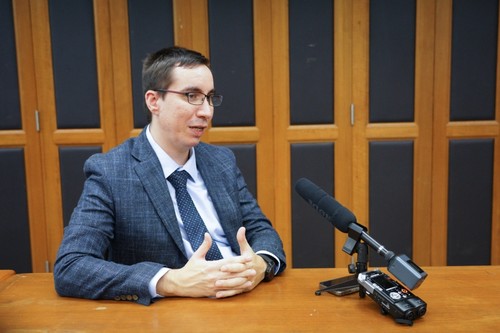 Dr. Balazs Szanto specializes in international security and international relations in the Asia-Pacific, primarily China, Japan and the ASEAN states. (Photo: Ngoc Diep) Dr. Balazs Szanto specializes in international security and international relations in the Asia-Pacific, primarily China, Japan and the ASEAN states. (Photo: Ngoc Diep)
|
VOV-Bangkok correspondent: How do you evaluate Thailand’s preparations for the APEC Summit and the leadership role of Thailand in this APEC year?
Dr. Balazs Szanto: Well, looking at how Thailand was preparing for APEC, the country obviously seems very excited to host it.
There's a lot of fun, first surrounding it, including a public holiday to ease congestion and facility and ensure the smoother holding of APEC. Thailand seems to be very well excited preparing to host roundtable conferences this year. As far as Thailand's leadership of APEC, it's a good opportunity for Thailand to discuss matters that are relevant not only to Thailand but to Southeast Asia or APEC in general. As the host, it will offer Thailand a unique opportunity to put its mark on how the conferences run.
VOV-Bangkok correspondent: Given the quite complicated situation now in the region and the world, what do you think about the role of APEC cooperation in promoting economic recovery in the post-pandemic?
Dr. Balazs Szanto: Well, if you're looking the state of the world today, the economy is on everybody's mind. The coronavirus pandemic has hit Southeast Asia just as hard as any other regions. And just as people were getting ready to recover from the coronavirus, we had other international calamities, such as the energy crisis in Europe that has really hindered a quick recovery. So I would expect that looking at what countries are interested in for APEC, the economy is in everybody's mind and the question is going to be how to deepen trade cooperation and how to put the region and the world in general back on track of growth and economic.
Unfortunately, many of the larger economies are in recession right now, and that's bad news for the Southeast Asian countries who depend on trade with those regions.
I expect that the agenda is going to be how to make sense of these difficult times and how cooperation between APEC and Southeast Asia and external trade partners can return economic growth to the region and the Asia - Pacific in general. The United States seems very interested in returning to the region and offering an economic trade package, in the form of the Indo-Pacific Economic framework.
China is also looking to bolster its own economy. I think there's a good opportunity for Southeast Asian countries that there are a lot of countries willing and eager to court the region economically. And that's good news. And we will just have to see what deals are made, either as part of APEC or on the sidelines where some of those deals are made. And hopefully it offers them way forward to recover from the various negative economic trends the region is facing right now, such as growing inflation and recession in major trade partners.
VOV-Bangkok correspondent: What is your opinion about the cooperation between Thailand and Vietnam at international and regional forums like APEC? What can two countries do to strengthen the cooperation?
Dr. Balazs Szanto: I think inter-ASEAN cooperation is going to be absolutely vital for the region. One of the things that ASEAN can see is that, even if they're not directly involved in events, because of their involvement in external trade and because of the export-oriented focus of many of their economies, they are still vulnerable or susceptible to geopolitical trends way outside Southeast Asia, such as the conflict in Ukraine. Because if it affects their trade partners, it affects them because it leads to a loss of trade. And I think that gives an opportunity for Vietnam and Thailand and the ASEAN countries in general to look for ways to deepen inner ASEAN and economic corporation, because ultimately they're all in the same boat when it comes to economic recovery.
The most reliable way for the region to recover is to deepen trade and cooperation amongst the ASEAN countries. So there's a robust internal market for ASEAN that allows them to insulate themselves to a certain extent from geopolitical trends. And essentially, if we look at Southeast Asia, the fortunes of all the countries are tied together.
It is not possible for Vietnam, Thailand, or any of the ASEAN countries to be prosperous if their neighbors are not prosperous. Because they are important trade partners to each other, and that will translate into their recovery. It would be a very varying trend if young countries try to recover on their own, at the expense of all the other countries because again, they're so interdependent and that means that they need to recover from this together and that needs the countries to work together.
VOV-Bangkok correspondent: Thank you for the interview.